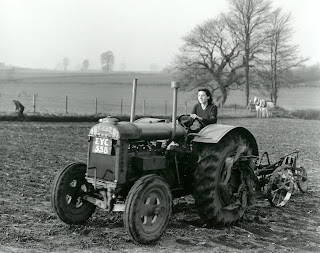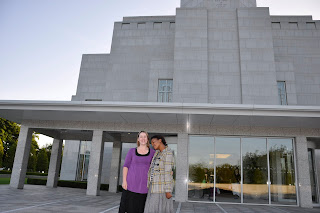A Corner of the Vineyard
by Denise Johannsen
Blessed By a Future Prophet
Numerous pairs of feet shuffling restlessly; men and women quietly exchanging polite conversation with each other--a sea of troubled faces [with] eyes that are heavy and void of all expression. It's as if the very light of dreams and aspirations had been snuffed cruelly from them. Hundreds of hungry mouths, with pursed lips and jaws set into frowns of deep despair. Line upon line of sullen drab figures seeming to form endless rows, stretching from the factory gates and flowing on into the nearby street; all they would be amongst the fortunate few to be hired that morning. Finally the great gates creak open. All eyes are fixed on the little sallow faced man who stands now in their midst. Anxious bodies surge forward, with waving hands and bated breath, they hope against hope. The hours of waiting over in an instant. "You, you, and you over there," the little man points as he speaks. The gates close once more, with hopes dashed, heads hung low, and shoulders hunched in despair, they move slowly away and disperse into the day, many of them off to form another queue, a queue of utter desperation--the dole queue.


The year is 1933. Britain is in the grip of the Great Depression. None harder hit than the inhabitants of Blackburn. No line of business escaped unscathed, except for the undertakes who were enjoying a little boom due to numerous suicides owing to empires crumbling, and huge fortunes being lost almost over night. Mill owners, finding themselves with fewer customers and failing profits, decided to leave, taking with them their cotton looms and a few of their most experienced weavers and spinners. Like rats leaving a sinking ship, they headed for Shanghai. Upon arrival, they found to their delight that the natives were eagre to work for virtually nothing. That, coupled with cheap land, cheap fuel, etc., boosted their profits and kept them in business. The irony of it was that this helped drive yet another nail into the massive coffin (describing at this time the Western economy). Meanwhile, back in Blackburn, factories were closing week by week. Nothing seemed to be able to stem the tide of disaster that was squeezing the very life force out of the town.

Poverty held these wretched souls once more in it's merciless claws. For some, all hope was gone, and finding themselves homeless and destitute, had no alternative but to submit their lives, together with their families, to the taskmaster and the dreaded workhouse. The workhouse . . . the name alone was enough to send shivers down any spine. A large, dismal Victorian building [with] huge blocks of sandstone which had been chiseled out of the mountain side. [It was] situated high above the town, looming inauspiciously; warning all who dwelt below that this too could be their end.
Others subjecting themselves to the degradation of the Means Test. To qualify for the grand total of 23 BPS a week dole money. Those who applied had to succumb to an invasion of privacy and humiliation. A member of the above mentioned department would come into the home and literally go through every cupboard making a note of all the possessions. If the people had any items of worth, they could not qualify for payment. The same applied if you had any amount of savings or even food. No matter how minuscule the aforementioned, you were not accepted.

Men and women who were travelling from town to town seeking employment could find a bowl of soup and shelter for the night at the soup kitchen. These charity run hostels provided sparse accommodation and the amenities were basic. Nevertheless, they found welcome refuge from the chill of the night air. In return for this succour they were expected to work for a day in the quarry.
 |
| Dole line in Britian in 1930s |
Housing conditions had not improved since the 1920s. Terraced houses still did not have bathrooms. The building trade had virtually come to a standstill . Some people now owned gas cookers, and electric, if they were sufficiently affluent. Needless to say, that meant most of the citizens of Blackburn still cooked on an open range, read by gaslight, and took their weekly soak in the tin bath by the fire. The ranges and boilers [were] built into the side of the fireplace, so until they had a roaring fire, they had no hot water. As the coal was rationed to three bags a fortnight, there was precious little of this luxurious commodity. A substitute for coal could be purchased called briquettes, which comprised of coal dust, and cement dust formed into bricks which were designed to burn slowly. Unfortunately, it was of very little use because it gave off hardly any heat.


Yet, as usual, true to the character of the northern man and woman, Blackburn folk found time to smile. They forgot for a brief moment the problems that surrounded them as they indulged themselves in the fantasy world of their heroes and heroins of the silver screen. Amongst other forms of amusement were dancing and the 6d theatre.
 |
| "Scarface" (movie of the 1930s) |
The Church of Jesus Christ of Latter-day Saints was still holding its own in Blackburn. Although still a small branch, the members were united in their quest of building Zion in this part of the Lord's vineyard. Despite the depression and the fall of the Wall Street stock exchange, the saints continued to emigrate in large numbers. Blackburn saints were no exception in the desire to head for Utah, to be amongst the majority of Mormons, instead of the minority, as was the case in England, and even more so in their native town of Blackburn. Those valiant souls who were left behind, laboured tirelessly to keep the branch open, continuing, as had their predecessors before them, to cultivate, nourish, and strengthen.
It was July of this same year (1933) that divine inspiration sent a young missionary from Utah to our shores. How our Heavenly Father must love and respect his sons and daughter in England, for he sent yet another future prophet to gain part of his schooling for the great calling he would one day undertake. He was to touch the hearts and bless many members in Blackburn--some who speak of him still today with love and admiration; also, of the impact he made whilst still a young man. One of these members, Dorothy Shorrock, who at the time was just a little girl, recalls affectionately how this great man used to sit her on his knee. So who better to describe the spirituaity of the Blackburn saints at this time than our present Prophet, President Gordon B. Hinckley. Yes, he was that young missionary of 1933.
The following was taken from a letter written to Sister Denise Johanssen, February 10th, 1995
by President Gordon B. Hinckley:
My first visit to Blackburn was in July 1933. I arrived in England a few days before that after crossing the ocean on the ship S.S. Manhattan. The first assignment of my mission was to Preston. Preston was then the headquarters of the Liverpool District of the mission.
I arrived in Preston as the junior companion to Elder Kent S. Bramwell. At that time the missionaries went on circuit, as it was called, that is, we visited the Sacrament Meetings and spoke in the various branches that comprised of the Liverpool District. These included branches in Preston, Blackburn, Accrington, Burnley, Nelson, Wigan, Liverpool, and a branch across the Mersey River, the name of which escapes me at the moment. These are the branches as I remember.
My first assignment, the Sunday following my arrival in Preston, was to the Blackburn Branch. I was a total stranger to the area and the people. I took the bus from Preston to Blackburn and found my way to the branch hall. It was an upstairs room which was rented on Sunday. It was not an attractive room. I suppose it was the best the Elders could find.
The branch president, as I recall, was a Brother Dawson. I do not recall his first name. I remember him as a little man with black hair, dark, piercing eyes, and a black moustache. He was a very earnest and sincere man who presided over a small congregation of Latter-Day Saints.
This was 1933 in the bottom of the Great Depression. Lancashire was terribly hard hit during the Depression. Many of the cotton mills had been closed. Very many of the people were on the dole. Some who had been proud of their independence, had been subjected to the means test, which was a humiliating experience. This was necessary to get on the dole.
Many were near the edge of poverty, and they looked it. Their clothes were worn and they knew much discouragement, but they were faithful and true, these wonderful men, and women, and children who were converts to The Church of Jesus Christ of Latter-Day Saints.
I have no remembrance of what I may have said in my talk on the occasion, but I do have remembrance of that small congregation, and that remembrance was fortified as I had occasion to return to Blackburn a few times during the following months before I was transferred to London. I served both in Blackburn and Nelson, but never resided in Blackburn. My strongest impression is the strength of the people.































































































